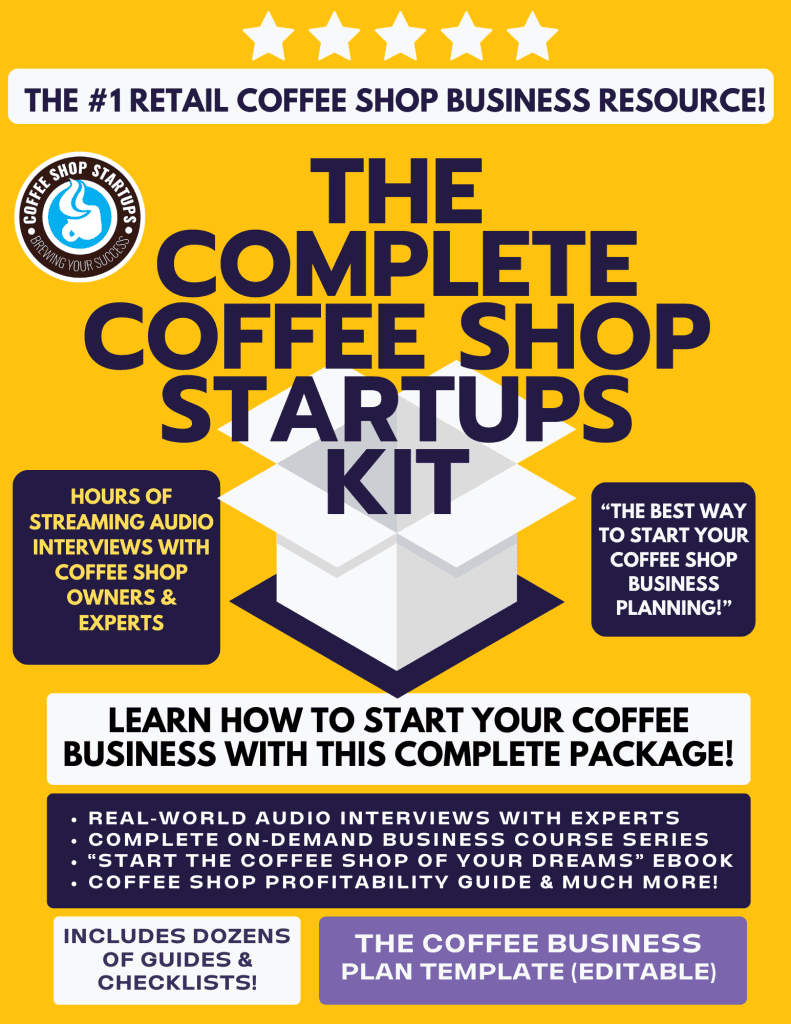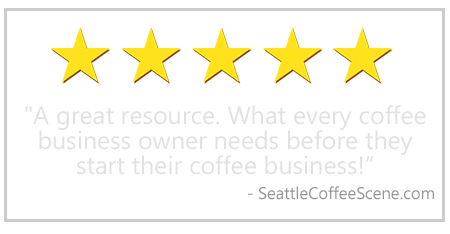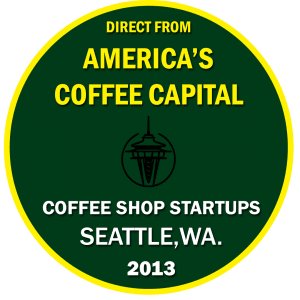Forecasting Your Coffee Shop Sales
Forecasting Your Coffee Shop Sales
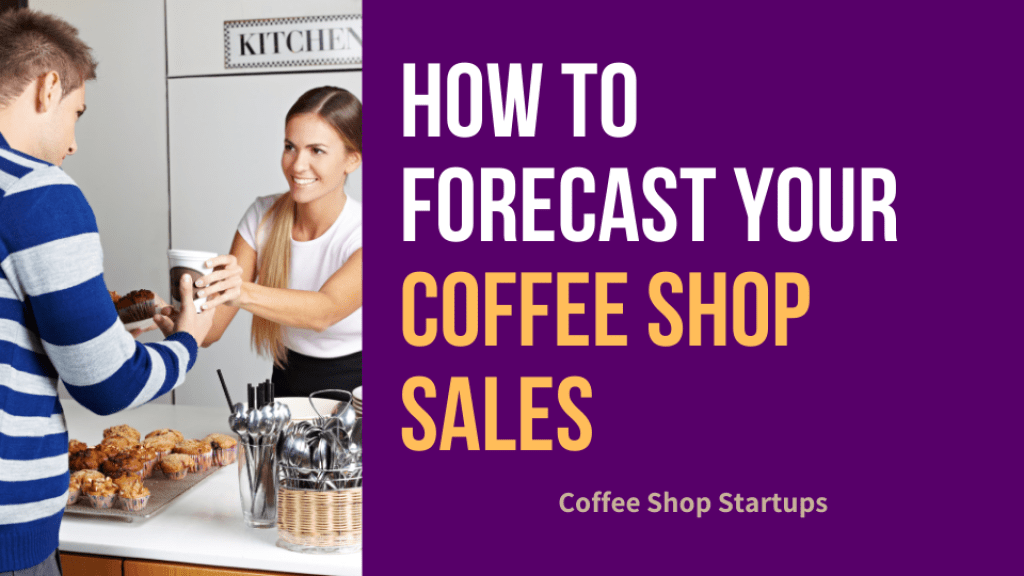
Coffee Shop Sales Estimates
How to Forecast Your Coffee Shop Sales & Income
Developing your financial estimates is a little bit of art and science. You will use your financial estimates to forecast your coffee shop business activity.
Your financial estimates can include everything from how much money you will make to how much your coffee business will cost.
If you intend to buy an existing coffee business, you'll hopefully obtain the existing data and numbers from the current owner. However, I wouldn't purchase an established business without knowing those numbers first.
On the other hand – if you are starting a new business from scratch, you'll need to make educated estimates of how many sales you'll have per day and the amount of revenue you'll be making. And then make some pretty important decisions based on those estimates.
Many new business owners often throw out random numbers as wild guesses as to what they will make or spend. This isn't a good idea. Instead, I believe that there are better ways to estimate just how many sales you will have.
In this post, we will tackle the topic of developing your coffee shop's financial estimates. This exercise can help develop your coffee shop funding mix, write your coffee shop business plan, as well as provide a guiding financial light you'll need as you move forward.
![]()
How to Forecast Coffee Shop Sales
There is more than one way to estimate your future sales. If you have your own method that can be reasonably backed up by data, feel free to use it.
By keeping things realistic and erring on the side of having conservative estimates, you'll be in good shape.
First, let's begin by recalling two primary elements we need to know for our financial analysis.
We need to approximate the following:
- The number of sales
- The average price of our receipts
Once we have these figure estimates, we can really begin to develop our additional forecasts of revenue and costs – or any other analysis you may need.
Other Coffee Shop Business Articles:
| Coffee Shop Ideas & Concepts | Coffee Shop Budget and Planning |
|---|---|
| 50 Coffee Shop Ideas & Concepts | 7 Ways to Open a Coffee Shop with No Money |
| Low-Cost Coffee Shop Ideas | Open a Coffee Shop Bookstore |
| How to Open a Drive-Thru Coffee Stand | How Much do Coffee Shop Owners Make? |
Coffee Shop Concept & Your Financial Estimates
Okay, let's start with our concept and how it impacts our estimates.
Your coffee shop concept will put your business into a particular expectation of “revenue generation” and costs. A larger café bakery, for example, will cost more but will also have the potential to make more revenue as well. Undoubtedly, a larger bakery has the “infrastructure” to generate more revenue.
Even in the most ideal situations, your coffee shop revenue and sales will often be limited by the size and scope of your business.
Case in point: A smaller drive-thru stand – while potentially profitable – will always be limited by the ability to get cars through their drive-thru lane and window fast enough.
For example, if you averaged four minutes for every car you served – you'd only be able to serve 15 vehicles per hour – per window.
So, even if you had cars for a mile down the road, you'd be limited by your structural capacity to serve coffee, your equipment's peak performance capabilities, your drive-thru coffee stand design, and the traffic flow.
On the other hand, if we consider an average coffee shop with interior seating with an occupancy permit for 49 people, for example, your estimates will be different from a coffee drive-thru stand.
All these nuances are essential to keep our concept in mind when coming up with our financial estimates and expectations.
Summary:
- The concept impacts your potential revenue generation
- Your physical size has a maximum sales capability
- Other factors may influence your sales capabilities
Estimated Hours of Operation
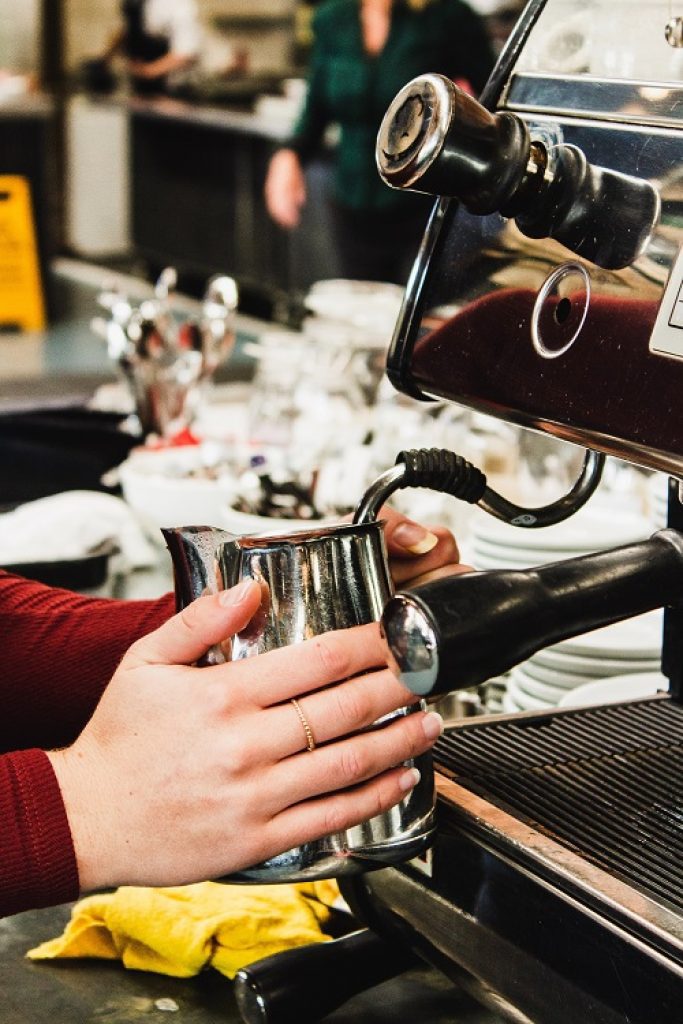 How long your business is open during the day (and making sales) should impact your coffee shop sales estimates.
How long your business is open during the day (and making sales) should impact your coffee shop sales estimates.
Generally, your location, menu, and customers will often determine your hours of operation. Some cafes and coffee shops are only open for the busiest times of day: morning and early afternoon.
After that, customer levels may drop considerably, and it may not make sense to keep the business open past a specific time. But on the other hand, the cost in labor, inventory, or utilities can eat your daily profits, so it may make sense to close.
However, a similar coffee shop with the same menu can be open for longer periods throughout the day – because of its location and their customers within that specific area – will propel the decision to stay open later because it is profitable to do so.
If, for example, you have a more substantial menu and serve alcohol at your café, you will probably be open more hours throughout the day. Remember, however, to calculate that in this case, you will have more operational expenses related to employee wages.
Expanding your coffee shop owners from 3 pm to 10 pm results in your coffee shop being open 49 more hours a week. Just how much of a revenue increase can we estimate with these expanded hours? How much ongoing expenses will you incur in this scenario?
Counting Your Coffee Customers
To generate your estimates, you'll need to collect essential data. Counting customers is one excellent and reliable way to estimate the potential sales volume in a specific location that you may be interested in leasing.
“Counting customers” is actually what the term states – counting potential customers at different times to determine sales estimates at a particular location.
The idea is that a similar rate of customers could be estimated for your coffee business – allowing for some deviation – due to the nature of the businesses and area you are counting in.
Of course, counting customers can't give you precise numbers. Still, it can provide you with ballpark estimates, essential for your planning, budgeting, and revenue forecasts, as well as capital you might be trying to obtain.
If you are negotiating to purchase an existing location, you may have the hard data of the existing business's receipts and profit and loss statements to get the exact figures.
However, as part of your due diligence, I recommend that you still count customers for your own research and see if the numbers gel with the information you gave prior to your purchase.
Further Reading: How to Start a Coffee Shop Successfully

Starting a Brand New Coffee Shop
Developing Your Sales Estimates With a New Business
How do you count or estimate customers if there is no coffee business there yet? Where do you get the numbers?
I recommend utilizing the “next best” option with the following points if this is the case.
You can count customers at:
- Neighboring businesses
- Another local coffee shop (competitor)
- Other local substitute businesses (i.e., pancake house)
Additionally, you may want to get street traffic information from your local transportation department. Many local DOTs actually have the average number of cars moving through a particular street, boulevard, or intersection. This can be extremely helpful!
Counting or estimating customers at local competitors may or may not be suitable. This is because they may be situated in an entirely different traffic situation – and have a different volume of vehicle traffic pedestrian traffic flanked by other stores or businesses.
Also, be aware that existing businesses have worked hard since their opening to develop their customer base. While you can count their customers, they may have invested in growing a solid local customer following and brand recognition – thus, increasing their numbers.
In other words, don't automatically assume that you will have the same numbers as an established business.
I also mentioned the possibility of counting customers at neighboring businesses. This is where a lot of the “art” comes into play. The neighboring business may be a busy UPS store, nail and hair salon, or a pizza shop – or a substitute business – like a local fast food joint where coffee is available. You may need to adjust your estimates based on the type of business you are counting from.
Data Assessment
Once you add up the data, you'll be able to forecast the numbers you will likely have at your business.
For the sake of this example, let's determine that you'll have 120 customers per day.
With this estimate, we can move to determine your average sales receipt.
Your Average Receipt Price
We can factor in our average receipt price now that we have potential customer volume.
For simplicity's sake, let's say that your average customer buys a coffee (latte) and doughnut every morning.
Based on your pricing, let's say that your average receipt will be approximately $7.25
Let's plug the numbers into the following formula:
Next, we will multiply our average daily sales by our average receipt price to get our estimated daily revenue.
Daily Sales x Average Receipt Price = Daily Revenue
Using the data, we can plug in the numbers:
120 x 7.25 = $870
Using the data estimates above, you will have $870 in revenue. You will be able to utilize this formula to determine how much money your coffee shop will make.
Forecasting Coffee Shop Sales
What can you do with this information?
- First, you can insert the data into your financial estimates.
- If you are buying an existing business – these numbers could help you negotiate a better or fairer price if you buy this business.
- However, suppose you are negotiating armed with better knowledge of the sales estimates. In that case, you can save yourself thousands of dollars (you will undoubtedly save way more than you'll spend on collecting the information)!
- Aside from that critical point, you can also use the information to determine how many baristas you'll need and when to schedule them throughout the week.
- Additionally, you will know approximately how many orders you will need to place from your vendors.
- The information can help you build your menu and help you determine your price points.
Due Diligence When Purchasing an Existing Business
Even if you are looking at the receipts or reports from the existing owner, you still need to do your homework. Understanding the actual numbers and cross-checking the data is always the best way to incorporate due diligence when spending a small fortune on any business.
Obtaining the information for yourself and thoroughly understanding your business workday's “ebb and flow” will provide you with the data set you need to better negotiate and help you with future planning.
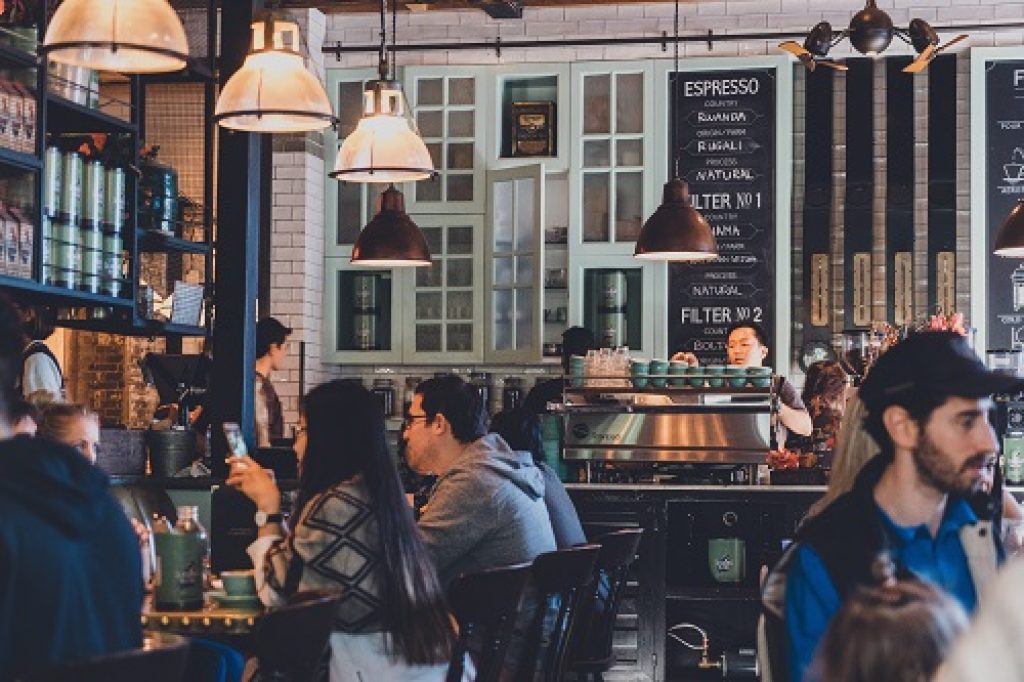
Other Factors to Develop Your Estimates
Counting customers is an important exercise, but other factors can be just as relevant as determining your sales estimates.
Consider looking at the demographics:
- Local population numbers
- Income
- Homeownership
- Age
- Education
Your coffee shop business aims to serve the best coffee and make money, so your customers are the primary focus. If you study the target market well, you can expect a certain number of sales and receipt prices. Keep in mind that your estimates will slightly change as you actually start working and will fluctuate depending on the season, financial situation, new businesses, etc.
Consider looking at your location:
- Anchor stores
- Neighboring businesses
- Local competition
- Schools/colleges/universities
Additionally, your final location may also impact your numbers. Neighboring anchor stores, schools, universities, businesses, venues, etc., can all play a big hand in your estimate factors.
Consider looking at the real estate:
- Property prices
- Public transportation routes and hubs
- Commuting routes
Look at trends in real estate and development. For example, if you open near a busy bus stop, subway, or metro line – consider the additional pedestrian and vehicular traffic.
The initial numbers you use to forecast your numbers will be estimates – but if you thoroughly look at these various factors and take the time to count your potential customers in some way – you'll be a lot more accurate in your assessments.
Will your marketing and promotion help?
Reflect on how your branding, marketing, and promotional efforts – and the menu- will impact your initial sales estimates.
Of course, generating marketing awareness and loyal customers with your menu, customer service, and USP – your unique sales proposition – can also have a tangible impact on your sales estimates.
It might be a little challenging to foresee how your marketing and promotion will impact your coffee sales. However, with a robust and smart marketing plan, you can surely expect higher customer volume and, thus, higher sales.
Additionally, counting customers and market analysis will allow you to determine a baseline in your calculations that is essential for your forecasting.
![]()
Are You Ready To Get Started?
Unlock Your Dream Coffee Shop Business with Our Exclusive Coffee Shop Startups Kit!
Ready to transform your passion for coffee into a thriving business? Look no further! Our Coffee Shop Startups Kit is your key to brewing success. Here's why you can't miss this opportunity:
![]() 35-Lecture Coffee Shop Business Course: Our kit provides a comprehensive A-to-Z lecture series that covers what you should know and how to plan your coffee business. No more guesswork – follow our proven roadmap for success.
35-Lecture Coffee Shop Business Course: Our kit provides a comprehensive A-to-Z lecture series that covers what you should know and how to plan your coffee business. No more guesswork – follow our proven roadmap for success.
![]() Comprehensive Coffee Shop Business Guide: Our kit includes a detailed, step-by-step guide that takes you from creating your concept to your grand opening.
Comprehensive Coffee Shop Business Guide: Our kit includes a detailed, step-by-step guide that takes you from creating your concept to your grand opening.
![]() Expert Interviews and Insights: Benefit from insider tips and industry secrets that successful coffee shop owners and experts share during one-on-one interviews. Learn from the best to stay ahead of the competition.
Expert Interviews and Insights: Benefit from insider tips and industry secrets that successful coffee shop owners and experts share during one-on-one interviews. Learn from the best to stay ahead of the competition.
![]() Business Essentials: We provide business plan templates, checklists, and resources to streamline your startup process. From permits to menu planning, we've got you covered.
Business Essentials: We provide business plan templates, checklists, and resources to streamline your startup process. From permits to menu planning, we've got you covered.
![]() Cost-effective Solutions: Save time and money with our expert advice and budgeting tips. Maximize your ROI and minimize headaches.
Cost-effective Solutions: Save time and money with our expert advice and budgeting tips. Maximize your ROI and minimize headaches.
![]() Adaptable to Any Setting: Our kit is designed to suit various locations and customer demographics, whether you're eyeing a trendy urban spot or a cozy corner in a suburban neighborhood.
Adaptable to Any Setting: Our kit is designed to suit various locations and customer demographics, whether you're eyeing a trendy urban spot or a cozy corner in a suburban neighborhood.
Includes Exclusive BONUS Material!
👉 Order Now and Begin Your Journey!
Don't let the complexities of starting a coffee shop overwhelm you. Our Coffee Shop Startups Kit is your ticket to entrepreneurial success. Take the first step towards owning a profitable and fulfilling coffee business today.
Join the thousands of successful coffee entrepreneurs who started with a dream and a great plan. Your journey to coffee shop greatness begins right here!
Comprehensive. Proven. Affordable.
The Complete Coffee Shop Startup Kit
(Instantly Delivered To You)
* The information on this page is for educational purposes only. We do not offer legal advice.


